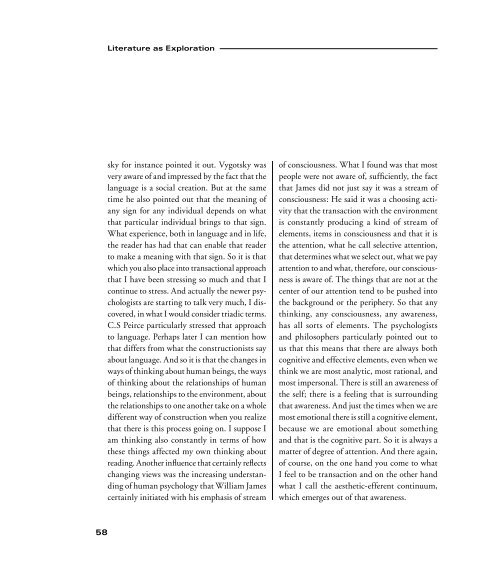Tidskrift för lärarutbildning och forskning 4/2005
Tidskrift för lärarutbildning och forskning 4/2005
Tidskrift för lärarutbildning och forskning 4/2005
You also want an ePaper? Increase the reach of your titles
YUMPU automatically turns print PDFs into web optimized ePapers that Google loves.
Literature as Exploration<br />
sky for instance pointed it out. Vygotsky was<br />
very aware of and impressed by the fact that the<br />
language is a social creation. But at the same<br />
time he also pointed out that the meaning of<br />
any sign for any individual depends on what<br />
that particular individual brings to that sign.<br />
What experience, both in language and in life,<br />
the reader has had that can enable that reader<br />
to make a meaning with that sign. So it is that<br />
which you also place into transactional approach<br />
that I have been stressing so much and that I<br />
continue to stress. And actually the newer psychologists<br />
are starting to talk very much, I discovered,<br />
in what I would consider triadic terms.<br />
C.S Peirce particularly stressed that approach<br />
to language. Perhaps later I can mention how<br />
that differs from what the constructionists say<br />
about language. And so it is that the changes in<br />
ways of thinking about human beings, the ways<br />
of thinking about the relationships of human<br />
beings, relationships to the environment, about<br />
the relationships to one another take on a whole<br />
different way of construction when you realize<br />
that there is this process going on. I suppose I<br />
am thinking also constantly in terms of how<br />
these things affected my own thinking about<br />
reading. Another influence that certainly reflects<br />
changing views was the increasing understanding<br />
of human psychology that William James<br />
certainly initiated with his emphasis of stream<br />
of consciousness. What I found was that most<br />
people were not aware of, sufficiently, the fact<br />
that James did not just say it was a stream of<br />
consciousness: He said it was a choosing activity<br />
that the transaction with the environment<br />
is constantly producing a kind of stream of<br />
elements, items in consciousness and that it is<br />
the attention, what he call selective attention,<br />
that determines what we select out, what we pay<br />
attention to and what, therefore, our consciousness<br />
is aware of. The things that are not at the<br />
center of our attention tend to be pushed into<br />
the background or the periphery. So that any<br />
thinking, any consciousness, any awareness,<br />
has all sorts of elements. The psychologists<br />
and philosophers particularly pointed out to<br />
us that this means that there are always both<br />
cognitive and effective elements, even when we<br />
think we are most analytic, most rational, and<br />
most impersonal. There is still an awareness of<br />
the self; there is a feeling that is surrounding<br />
that awareness. And just the times when we are<br />
most emotional there is still a cognitive element,<br />
because we are emotional about something<br />
and that is the cognitive part. So it is always a<br />
matter of degree of attention. And there again,<br />
of course, on the one hand you come to what<br />
I feel to be transaction and on the other hand<br />
what I call the aesthetic-efferent continuum,<br />
which emerges out of that awareness.<br />
58

















